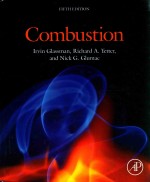图书介绍
COMBUSTION2025|PDF|Epub|mobi|kindle电子书版本百度云盘下载

- IRVIN GLASSMAN 著
- 出版社: ELSEVIER
- ISBN:9780124079137
- 出版时间:2015
- 标注页数:757页
- 文件大小:86MB
- 文件页数:770页
- 主题词:
PDF下载
下载说明
COMBUSTIONPDF格式电子书版下载
下载的文件为RAR压缩包。需要使用解压软件进行解压得到PDF格式图书。建议使用BT下载工具Free Download Manager进行下载,简称FDM(免费,没有广告,支持多平台)。本站资源全部打包为BT种子。所以需要使用专业的BT下载软件进行下载。如BitComet qBittorrent uTorrent等BT下载工具。迅雷目前由于本站不是热门资源。不推荐使用!后期资源热门了。安装了迅雷也可以迅雷进行下载!
(文件页数 要大于 标注页数,上中下等多册电子书除外)
注意:本站所有压缩包均有解压码: 点击下载压缩包解压工具
图书目录
CHAPTER 1 Chemical thermodynamics and flame temperatures1
1.1 Introduction1
1.2 Heats of Reaction and Formation1
1.3 Free Energy and the Equilibrium Constants8
1.4 Flame Temperature Calculations16
1.4.1 Analysis16
1.4.2 Practical Considerations21
1.5 Sub and Supersonic Combustion Thermodynamics31
1.5.1 Comparisons31
1.5.2 Stagnation Pressure Considerations32
Problems34
References39
CHAPTER 2 Chemical kinetics41
2.1 Introduction41
2.2 Rates of Reactions and their Temperature Dependence41
2.2.1 The Arrhenius Rate Expression43
2.2.2 Transition State and Recombination Rate Theories45
2.3 Simultaneous Interdependent Reactions50
2.4 Chain Reactions51
2.5 Pseudo-First-Order Reactions and the “Falloff” Range54
2.6 The Partial Equilibrium Assumption57
2.7 Pressure Effect in Fractional Conversion58
2.8 Chemical Kinetics of Large Reaction Mechanisms59
2.8.1 Sensitivity Analysis60
2.8.2 Rate-of-Production Analysis62
2.8.3 Coupled Thermal and Chemical Reacting Systems62
2.8.4 Mechanism Simplification64
Problems65
References69
CHAPTER 3 Explosive and general oxidative characteristics of fuels71
3.1 Introduction71
3.2 Chain Branching Reactions and Criteria for Explosion71
3.3 Explosion Limits and Oxidation Characteristics of Hydrogen78
3.4 Explosion Limits and Oxidation Characteristics of Carbon Monoxide86
3.5 Explosion Limits and Oxidation Characteristics of Hydrocarbons91
3.5.1 Organic Nomenclature92
3.5.2 Explosion Limits96
3.5.3 “Low-Temperature” Hydrocarbon Oxidation Mechanisms99
3.6 The Oxidation of Aldehydes105
3.7 The Oxidation of Methane106
3.7.1 Low-Temperature Mechanism106
3.7.2 High-Temperature Mechanism108
3.8 The Oxidation of Higher-Order Hydrocarbons111
3.8.1 Aliphatic Hydrocarbons111
3.8.2 Alcohols120
3.8.3 Aromatic Hydrocarbons123
3.8.4 Supercritical Effects132
3.8.5 Biofuels135
Problems141
References143
CHAPTER 4 Flame phenomena in premixed combustible gases147
4.1 Introduction147
4.2 Laminar Flame Structure151
4.3 Laminar Flame Speed153
4.3.1 Theory of Mallard and Le Chatelier155
4.3.2 Theory of Zeldovich,Frank-Kamenetskii,and Semenov160
4.3.3 Comprehensive Theory and Laminar Flame Structure Analysis166
4.3.4 Laminar Flame and Energy Equation174
4.3.5 Flame Speed Measurements174
4.3.6 Experimental Results—Physical and Chemical Effects182
4.4 Stability Limits of Laminar Flames189
4.4.1 Flammability Limits189
4.4.2 Quenching Distance197
4.4.3 Flame Stabilization (Low Velocity)198
4.4.4 Stability Limits and Design205
4.5 Flame Progagation through Stratified Combustible Mixtures208
4.6 Turbulent Reacting Flows and Turbulent Flames210
4.6.1 Rate of Reaction in a Turbulent Field212
4.6.2 Regimes of Turbulent Reacting Flows215
4.6.3 Turbulent Flame Speed227
4.7 Stirred Reactor Theory231
4.8 Flame Stabilization in High-Velocity Streams235
4.9 Combustion in Small Volumes245
Problems248
References251
CHAPTER 5 Detonation255
5.1 Introduction255
5.1.1 Premixed and Diffusion Flames255
5.1.2 Explosion,Deflagration,and Detonation255
5.1.3 The Onset of Detonation256
5.2 Detonation Phenomena258
5.3 Hugoniot Relations and the Hydrodynamic Theory of Detonations259
5.3.1 Characterization of the Hugoniot Curve and the Uniqueness of the Chapman Jouguet Point260
5.3.2 Determination of the Speed of Sound in the Burned Gases for Conditions above the C-J Point269
5.3.3 Calculation of the Detonation Velocity273
5.4 Comparison of Detonation Velocity Calculations with Experimental Results277
5.5 The ZND Structure of Detonation Waves284
5.6 The Structure of the Cellular Detonation Front and Other Detonation Phenomena Parameters288
5.6.1 The Cellular Detonation Front288
5.6.2 The Dynamic Detonation Parameters292
5.6.3 Detonation Limits293
5.7 Detonations in Nongaseous Media296
Problems297
References298
CHAPTER 6 Diffusion flames301
6.1 Introduction301
6.2 Gaseous Fuel Jets301
6.2.1 Appearance302
6.2.2 Structure306
6.2.3 Theoretical Considerations309
6.2.4 The Burke-Schumann Development312
6.2.5 Conserved Scalars and Mixture Fraction319
6.2.6 Turbulent Fuel Jets320
6.3 Burning of Condensed Phases322
6.3.1 General Mass Burning Considerations and the Evaporation Coefficient323
6.3.2 Single Fuel Droplets in Quiescent Atmospheres327
6.4 Burning of Droplet Clouds350
6.5 Burning in Convective Atmospheres351
6.5.1 The Stagnant Film Case351
6.5.2 The Longitudinally Burning Surface353
6.5.3 The Flowing Droplet Case355
6.5.4 Burning Rates of Plastics:The Small B Assumption and Radiation Effects357
Problems359
References361
CHAPTER 7 Ignition363
7.1 Concepts363
7.2 Chain Spontaneous Ignition366
7.3 Thermal Spontaneous Ignition368
7.3.1 Semenov Approach of Thermal Ignition368
7.3.2 Frank-Kamenetskii Theory of Thermal Ignition373
7.4 Forced Ignition378
7.4.1 Spark Ignition and Minimum Ignition Energy379
7.4.2 Ignition by Adiabatic Compression and Shock Waves384
7.5 Other Ignition Concepts385
7.5.1 Hypergolicity and Pyrophoricity386
7.5.2 Catalytic Ignition389
Problems390
References391
CHAPTER 8 Environmental combustion considerations393
8.1 Introduction393
8.2 The Nature of Photochemical Smog394
8.2.1 Primary and Secondary Pollutants395
8.2.2 The Effect of NOx395
8.2.3 The Effect of SOx398
8.3 Formation and Reduction of Nitrogen Oxides400
8.3.1 Structure of Nitrogen Oxides402
8.3.2 Effect of Flame Structure403
8.3.3 Reaction Mechanisms of Oxides of Nitrogen403
8.3.4 Reduction of NO x419
8.4 SOx Emissions424
8.4.1 Product Composition and Structure of Sulfur Compounds425
8.4.2 Oxidative Mechanisms of Sulfur Fuels426
8.5 Particulate Formation438
8.5.1 Characteristics of Soot439
8.5.2 Soot Formation Processes440
8.5.3 Experimental Systems and Soot Formation441
8.5.4 Sooting Tendencies443
8.5.5 Detailed Structure of Sooting Flames455
8.5.6 Chemical Mechanisms of Soot Formation460
8.5.7 Influence of Physical and Chemical Parameters on Soot Formation463
8.6 Stratospheric Ozone466
8.6.1 The HOx Catalytic Cycle467
8.6.2 The NOx Catalytic Cycle468
8.6.3 The ClOx Catalytic Cycle470
Problems471
References472
CHAPTER 9 Combustion of nonvolatile fuels477
9.1 Carbon Char,Soot,and Metal Combustion477
9.2 Metal Combustion Thermodynamics478
9.2.1 The Criterion for Vapor-Phase Combustion478
9.2.2 Thermodynamics of Metal-Oxygen Systems478
9.2.3 Thermodynamics of Metal-Air Systems491
9.2.4 Combustion Synthesis495
9.3 Diffusional Kinetics501
9.4 Diffusion-Controlled Burning Rate503
9.4.1 Burning of Metals in Nearly Pure Oxygen504
9.4.2 Burning of Small Particles—Diffusion versus Kinetic Limits506
9.4.3 The Burning of Boron Particles510
9.4.4 Carbon Particle Combustion (C.R.Shaddix)511
9.5 Practical Carbonaceous Fuels (C.R.Shaddix)514
9.5.1 Devolatilization514
9.5.2 Char Combustion519
9.5.3 Pulverized Coal Char Oxidation520
9.5.4 Gasification and Oxycombustion522
9.6 Soot Oxidation (C.R.Shaddix)527
9.7 Catalytic Combustion530
Problems534
References534
Appendixes537
Appendix A:Thermochemical data and conversion factors539
Appendix B:Adiabatic flame temperatures of hydrocarbons651
Appendix C:Specific reaction rate constants655
Appendix D:Bond dissociation energies of hydrocarbons681
Appendix E:Flammability limits in air689
Appendix F:Laminar flame speeds697
Appendix G:Spontaneous ignition temperature data705
Appendix H:Minimum spark ignition energies and quenching distances731
Appendix I:Programs for combustion kinetics735
Index747
热门推荐
- 3751479.html
- 3352320.html
- 3772857.html
- 1437212.html
- 2606050.html
- 1188799.html
- 3465995.html
- 2935991.html
- 2889133.html
- 3814686.html
- http://www.ickdjs.cc/book_1564415.html
- http://www.ickdjs.cc/book_599199.html
- http://www.ickdjs.cc/book_2144192.html
- http://www.ickdjs.cc/book_442749.html
- http://www.ickdjs.cc/book_3630221.html
- http://www.ickdjs.cc/book_653013.html
- http://www.ickdjs.cc/book_1573233.html
- http://www.ickdjs.cc/book_1344746.html
- http://www.ickdjs.cc/book_2016571.html
- http://www.ickdjs.cc/book_2941300.html